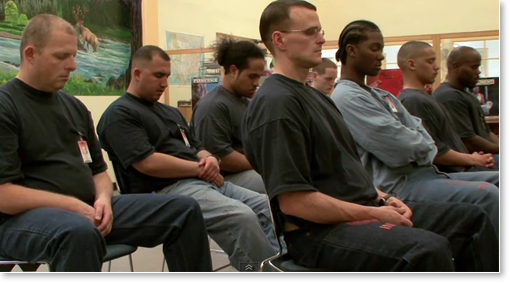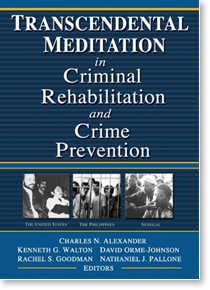 The number of Americans behind bars is staggering—and a horrendous waste of both human and financial resources.
The number of Americans behind bars is staggering—and a horrendous waste of both human and financial resources.
According to the U.S. Bureau of Justice Statistics (BJS) more than 2 million adults are incarcerated in federal and state prisons, and county jails in the United States. Additionally, more than 5 million adults are on probation or on parole. In total, more than 7 million people are under correctional supervision (probation, parole, jail, or prison) — about 3.1% of adults in the U.S. resident population.
Statistics indicate that more than 65% of those released from prison are rearrested, reconvicted, and return to prison within three years of release.
Can the Transcendental Meditation program help address this problem? Forty years of research and experience in the US correctional system offers a resounding “Yes!”
See what you think by watching the video below.
Highlights of inmate interviews – Oregon State Correctional Institution
Robert:
“I changed a lot from when I first got incarcerated. Once I started meditating, it just went through the roof….
“I used to fight a lot, now that I’ve been meditating I’m a lot more calm, and nothing angers me like it used to.”
James:

“I’ve had anger issues in my past and assaulted behavior, and this is really helping me with my anger issues. I let a lot of things go that I wouldn’t have years ago, and even as long as a few months back I wouldn’t have let it go. Now, it doesn’t make a bit of difference to me what somebody says because I keep thinking I’m going to go home, they’re going to come back here.
“Well, I really think that this program could benefit a lot of people, if they’re at that point in their life where they want to do something more. Instead of keep doing the same things over and over again and expecting some different outcome.”
Ledarius:

“We do crimes and make the wrong choices and decisions. Usually, it’s people in a rough situation, a tense situation. Either they’re having family problems or they need the money, so they just react.
“Now, if you just take out time each day to meditate and just sit back and let everything go and don’t worry about any of your worries or problems and just let everything go and free your mind, then you’re more likely to actually think it through…. If you just take out time and meditate and just let everything go and free your mind, everything comes together.
“Before meditation, I wasn’t really patient with people…. I would just lose my temper instantly—just go off. But now I can actually just like sit back, breath a couple seconds, take time out, and just be patient with them, and then everything seems to go the way I want it to.”
Sisi:

“I just tell them I’m spending time with myself. That’s actually what it really is, just spending time with your inner self, and everybody inside is a good person, you know, we just make bad choices.”
“Spending time with myself actually makes me feel good. I’m actually starting to know who I am.”
Kevin:

“The thing that resonated most deeply with me was just the chance at being happy. I hadn’t realized for how many years that I’ve always had a low-grade depression—it really was, probably ever since ten years old—I just really had been miserable with being myself. In just this last month I felt so much energy it’s been amazing.
“I actually consider that the department of corrections would be changed dramatically by making TM available to anyone who could learn it. The reason being, is the systems broke, and this is the first time I felt this sort of health that I think everyone should have the opportunity to feel this healthy and continue on and grow. You can’t change the system, but you can change the people inside of it; and by changing that, it will change the system.”
Jake:

“I’ve taken all these programs, I’ve been in here a long time and I’ve taken all their other programs for cognitive thinking and its kind of to change the way you think and you look at the world is what they’re trying to get you to do, so it’s not all about you, you know, but if you’re not ready for that or you’re not mature enough for that, then stuff doesn’t take. It’s just a place to go to make your counselor happy—to get your good time or whatever.
“I think that the TM should be the first thing that they offer and then build on it with these other programs once you’ve been integrated with TM, that’s my point of view from being here so long. It’s that the way your brains working from when you first get here needs to change first before any of those programs can be effective.”

__________________________________________________________

Research has shown that the Transcendental Meditation technique can reduce prisoner recidivism while simultaneously developing psychological functioning. For a summary of the research go to:
“Transcendental Meditation in Criminal Rehabilitation and Crime Prevention”
For a link to the research on the effect of TM on rehabilitation conducted at Folsom State Prison in California, CLICK HERE.
__________________________________________________________
Guest Blogger: Arielle Feldman is from Potomac, MD and is currently a sophomore at Towson University.




